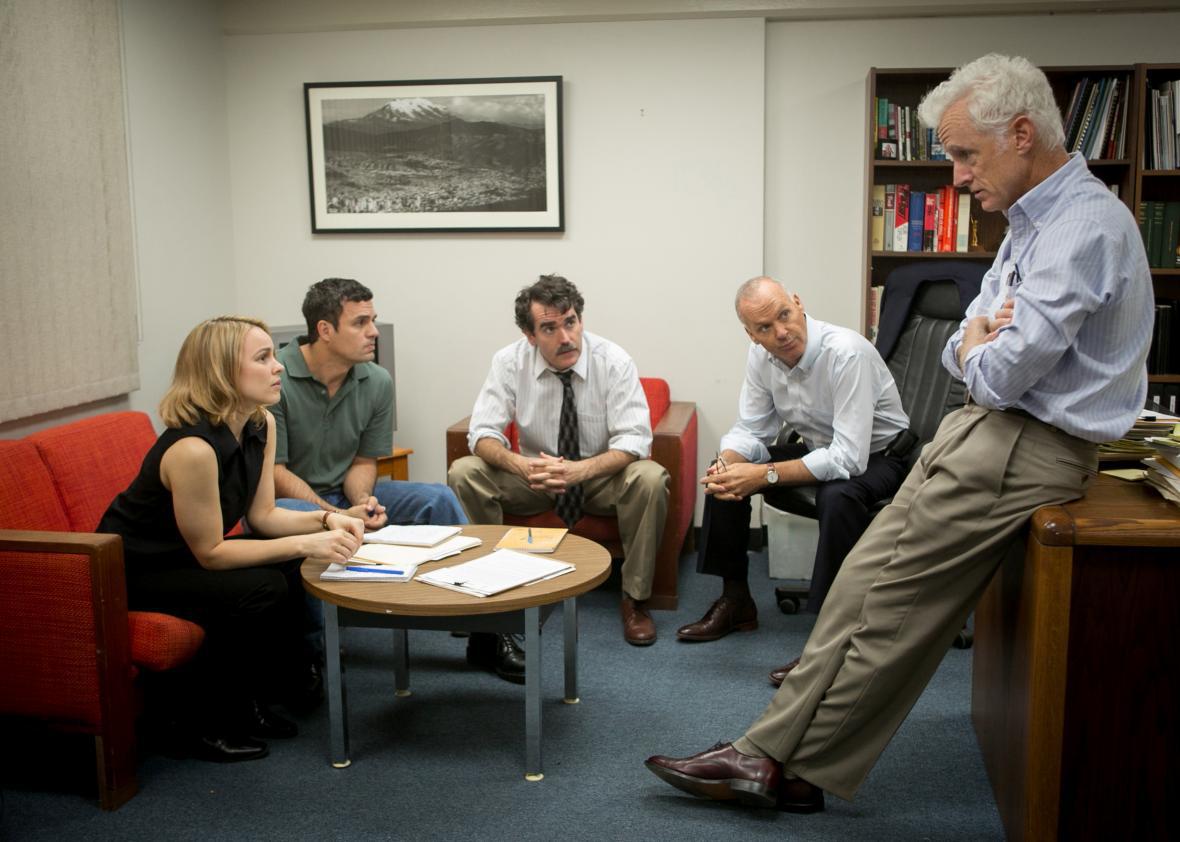Since beginning its festival run in September, Oscar buzz has swirled around Spotlight, and only grown louder as each week goes by. Vulture’s Kyle Buchanan was the first to anoint it the Best Picture front-runner, positing that after more “daring” recent picks in the last couple of years (Birdman, 12 Years a Slave), Spotlight’s “down-the-middle, perfectly executed pitch” will appeal to voters looking to return to more conventional fare. The Hollywood Reporter got in on the action, and so did Vanity Fair and many others. Now that the film’s in theaters and earning money, the tone has shifted from discussing the film as a “front-runner” to declaring it the eventual victor: It’s gained a solid lead in Gold Derby’s Best Picture horse race, based on the predictions of 12 of the site’s 22 “Oscar experts.”
But is it really a Best Picture? Consider who’s making these proclamations. The people declaring a movie about a tireless, dedicated group of journalists unraveling a major scandal the Best Picture front-runner all work in, well, journalism. Spotlight isn’t just any journalism movie; it depicts journalism in its most pure, honorable form (in that the Globe’s team exposed a grave injustice, deservedly winning a Pulitzer Prize for Public Service). It’s a tribute to shoe-leather reporting in the pre-Internet era. To top it all off, it’s a good movie about journalism, in a world where so many such films get it wrong. Will those who aren’t personally invested in the resurrection of good ol’ fashioned reporting find this movie as compelling as ink-stained wretches do?
A sift through a handful of Spotlight’s reviews paint a picture of just how much significance has been placed on it as a definitive movie about journalism.
Once in a while a good movie about journalism comes along to remind you that behind every important news story stand the men and women who researched, interviewed, and fact-checked to make it that way.
Spotlight instead shows how such a well-orchestrated secret can be uncovered: not through the will of one editor or reporter, but through the combined efforts of a well-run, well-staffed journalistic organ not beholden to moneyed interests, and with enough will to push past any political or social pressures.
Everything in this movie works, which is only fitting, since its vision of heroism involves showing up in the morning and — whether inspired by bosses or in spite of them — doing the job.
These reporters are jittery obsessives who put their lives on hold for a story they believe in. Do they get off on it? You bet. They’re hardcore guardians of an endangered galaxy. And heroes, in my book.
With the decline of newspapers and the fact that rich, vibrant investigative reporting is slipping into the background in today’s media, a movie like this reminds us just how important this vital work can be.
But as these reviews also point out, Spotlight is unabashedly unostentatious. The performances are unfussy and understated, as is Tom McCarthy’s straightforward screenplay, which avoids queasy clichés like flashbacks of sexual abuse. (It also avoids, for the most part, placing any major obstacles in its heroes’ way; getting the story is hard work, but it doesn’t feel dangerous or, a few dire warnings from old Bostonians aside, particularly risky.) “Visually, the movie is about as compelling as a day-old coffee stain,” A.O. Scott wrote, in praise of the film. Just like editor Walter Robinson’s (Michael Keaton) real-life Spotlight team, all the players involved in creating the film just come in and do their jobs, no grandstanding necessary.
That’s admirable. That’s thematically and aesthetically the right choice. That’s also not what the academy is looking for in its Best Picture winners as of late. Birdman, 12 Years a Slave, and The Artist were all visually stunning, films that showed off the wonder and power of cinema in their own stylistic ways. Argo was a rollicking adventure-thriller specifically about moviemaking, a favorite subject matter for the academy, representative of an industry just as prone as journalism to looking inward. (Ditto The Artist and, in a similar vein, the theatrically-set Birdman.)
I’m a journalist, and I liked Spotlight. It’s a solid movie. Solid can be enough to get a nomination—and at this point in the season, with so much up in the air and many highly anticipated films yet to screen for critics, Spotlight’s Best Picture nod seems like a sure bet—but solid doesn’t cut it for making it to the finish line. The academy likes to be dazzled, or to feel as though it’s commenting on sweeping social issues in a thoughtful way, or to be really, truly moved. And there will likely be shinier, more “urgent,” more straightforwardly emotional films, like Alejandro González Inárritu’s The Revenant, Todd Haynes’ lesbian romance Carol, or even Ryan Coogler’s Rocky update Creed, that could still steal Spotlight’s thunder as the awards season progresses.
That last film I mentioned raises an interesting possibility. Many have compared Spotlight to All the President’s Men. But even that film, which likewise chronicled the unraveling of an institution from the point of view of the journalists pursuing the story, was more cinematically thrilling than Spotlight. Set aside the noir-ish clandestine meetings between Robert Redford’s Bob Woodward and Deep Throat in a parking garage; even the movie’s opening, the jarring clang of a typewriter key hitting the page, is calculated to produce a riveting dramatic effect of the sort that McCarthy’s film waves away. For what it’s worth, All the President’s Men was nominated for Best Picture in 1977. It lost to Rocky.
